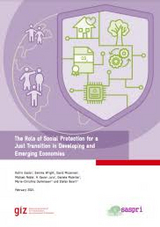Externe Publikationen

The Role of social protection for a just transition in developing and emerging economies
Gasior, Katrin / Gemma Wright / David McLennan / Michael Noble / Xavier Jara / Daniele Malerba / Marie Christina Dankmeyer / Stefan BeierlExterne Publikationen (2024)
Bonn/Kapstadt: GIZ/SASPRI
This study explores how social protection can alleviate the adverse socio-economic effects of climate change mitigation policies – notably carbon pricing and the removal of fuel/electricity subsidies – especially on vulnerable people and people living in poverty, thereby contributing to a just transition. The focus of the study is on six developing and emerging economies – Ecuador, Indonesia, South Africa, Tanzania, Viet Nam and Zambia – with different levels of carbon footprint and different starting points for expanding social protection. Using tax-benefit microsimulation, the analysis introduces climate change mitigation policies, provides an insight into the poverty impact of these policies across population groups, and uses the fiscal space created by carbon pricing or fossil fuel subsidy removal to simulate social protection expansion. The results indicate that such policies can have significant impacts on people, especially in countries where climate-friendly energy sources are scarce and behavioural change is difficult, and highlight the importance of the country context, including the existing gaps in and limitations of a country’s social protection system. While the design of climate change mitigation policies and a country’s carbon footprint determine the fiscal space that can be generated for social protection reforms, the effectiveness of such reforms also depends on the generosity and coverage of existing social protection schemes, as well as the current poverty level. The analysis shows that all types of expansion (increased benefit amount, increased coverage and categorical benefits) cushion the overall impact, but that expansion to more people can yield better results for lower-income population groups in places where significant coverage gaps remain and an increase in benefit amount results in better cushioning effects in places where poverty is concen- trated at the bottom of the income/consumption distribution
Kontakt
Cornelia Hornschild
Koordinatorin Publikationen
E-Mail Cornelia.Hornschild@idos-research.de
Telefon +49 (0)228 94927-135
Fax +49 (0)228 94927-130
Alexandra Fante
Bibliothekarin/Open Access-Koordinatorin
E-Mail Alexandra.Fante@idos-research.de
Telefon +49 (0)228 94927-321
Fax +49 (0)228 94927-130


